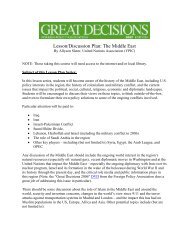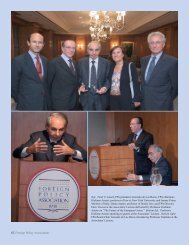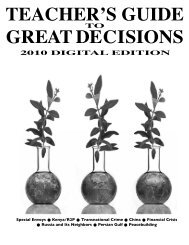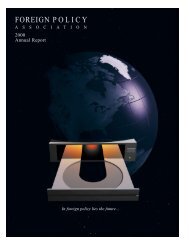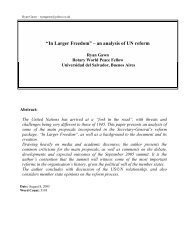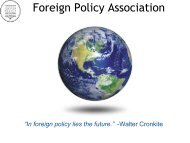Celebrating 90 Years - Foreign Policy Association
Celebrating 90 Years - Foreign Policy Association
Celebrating 90 Years - Foreign Policy Association
Create successful ePaper yourself
Turn your PDF publications into a flip-book with our unique Google optimized e-Paper software.
Creating Shared Value and<br />
Food Security<br />
108 | FOREIGN POLICY ASSOCIATION<br />
(Continued)<br />
the form of floods and droughts, play a role, the<br />
largest single cause for our current predicament<br />
is a combination of poor judgment and irresponsible<br />
decisions made by policymakers around<br />
the world. We have caused this mess, and the<br />
good news is that we have the capacity to fix it.<br />
There are four major obstacles to longterm<br />
global food security that I would like to<br />
focus on: 1) protectionism, 2) lower agricultural<br />
productivity, 3) expanding use of biofuels, and<br />
4) overexploitation of our most precious natural<br />
resource: water.<br />
First, protectionism. Some of the blame<br />
for our current state of affairs lies in failed and<br />
misguided agricultural policies and protectionist<br />
trends that governments around the world<br />
have adopted. The failure of the Doha Round<br />
of World Trade Organization negotiations, for<br />
example, can be attributed in great part to the<br />
refusal by developed countries to let farmers<br />
in developing countries compete on an even<br />
playing field.<br />
There are four major obstacles to<br />
long-term global food security:<br />
1) protectionism, 2) lower agri-<br />
cultural productivity, 3) expand-<br />
ing use of biofuels, and 4) over-<br />
exploitation of our most precious<br />
natural resource: water.<br />
It is shocking to me that despite<br />
the advances in new technologies<br />
and their availability, our ability<br />
to produce food is actually on<br />
the decline.<br />
In the Organization for Economic<br />
Cooperation and Development (OECD) alone,<br />
agricultural support amounts to over $340<br />
billion. This kind of agricultural protectionism<br />
fundamentally hurts farmers in the developing<br />
world by shutting them out of the most lucrative<br />
markets and hurts global consumers by<br />
artificially maintaining inflated prices for goods.<br />
As a company, Nestlé continues to oppose<br />
these types of trade-distorting subsidies.<br />
Second, decreased agricultural productivity<br />
globally. It is shocking to me that<br />
despite the advances in new technologies<br />
and their availability, our ability to produce<br />
food is actually on the decline. For decades,<br />
productivity growth in agriculture far exceeded<br />
productivity increases in manufacturing and<br />
services, thanks to better technology, greater<br />
professionalism, specialization, and the food<br />
industry’s efforts to create a more efficient<br />
supply chain. As a result, between 1950 and<br />
19<strong>90</strong>, the average inflation-adjusted price of<br />
agricultural products, indexed to wages, fell by<br />
approximately 75 percent. Since food is the<br />
largest single expenditure for poor households,<br />
this sustained decrease in pricing was a major<br />
contributor to alleviating poverty.




